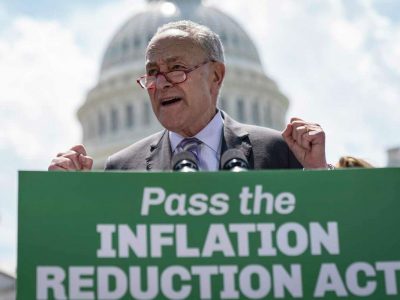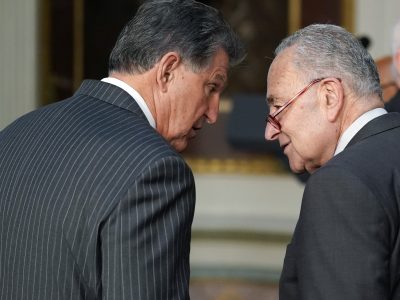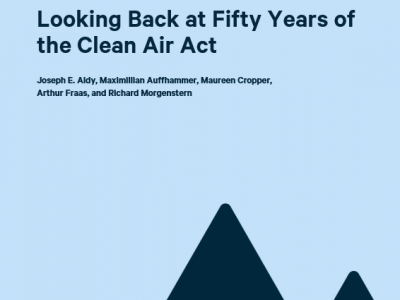Regulation
U.C. Davis Law School to Host “Clean Water Act at 50” Conference
Interdisciplinary Event Will Assess Landmark Law’s Past, Assess Its Future
On Friday, October 7th, the California Environmental Law & Policy Center at U.C. Davis School of Law will convene a major, day-long conference to commemorate the 50th anniversary of the federal Clean Water Act. The event will assess the progress the U.S. has made over the past half-century in abating water pollution; focus on some …
Continue reading “U.C. Davis Law School to Host “Clean Water Act at 50” Conference”
CONTINUE READINGJobs and Environmental Regulation
“Job-killing regulation”? That’s not really what the evidence tells us.
Labor Day is a good time to talk about an important topic: the impact of environmental regulation on jobs. This is a clearly a fraught issue. In support of his deregulation campaign, President Trump promised to “cancel every needless job-killing regulation and put a moratorium on new regulations until our economy gets back on its …
Continue reading “Jobs and Environmental Regulation”
CONTINUE READINGA Design Flaw in the Clean Air Act
Why have technology-based standards if you have air quality standards?
The Clean Air Act has two kinds of standards. It sounds like having two kinds of standards should improve air quality more than a single standard. But in reality, one type of standard can result in canceling out the benefits of the other type. If you understand the statute, this is actually pretty obvious once …
Continue reading “A Design Flaw in the Clean Air Act”
CONTINUE READINGDoes the New Climate Law Expand Regulatory Authority?
It’s not the game changer some people think, but IRA could help in several ways.
There’s been a lot of recent talk about whether the Inflation Reduction Act (IRA) indirectly overrides West Virginia v. EPA. The answer to that is probably “no.” However, some IRA provisions will help lawyers defend certain regulatory actions. IRA may also have an important framing effect when courts are considering the reasonableness of agency actions. …
Continue reading “Does the New Climate Law Expand Regulatory Authority?”
CONTINUE READINGThe Side Deal
How would the Manchin-Schumer deal on permitting impact the environment?
To get Manchin’s vote for the $379 billion in environmental spending in the IRA bill, Schumer and other congressional leaders had to agree to support Manchin’s efforts to speed up the permit system. At this point, all we have is a one-page list of permitting changes that would form the basis of a new bill. …
Continue reading “The Side Deal”
CONTINUE READINGTaking A Data-Driven Tour of Air Pollution Law
After Half a Century, What Do We Really Know about the Impacts of the Clean Air Act?
Earlier this year, a team of economists published a retrospective paper on the Clean Air Act. It surveys the economic literature to find out what the data tells us about emission trading systems, the effects of pollutants, and effects of imposing tougher regulatory requirements in areas that failed to meet national air quality standards. Some …
Continue reading “Taking A Data-Driven Tour of Air Pollution Law”
CONTINUE READINGMaking Heat Pumps Accessible and Affordable to Decarbonize Buildings
New policy report on solutions to improve deployment of heat pump technologies in existing buildings | Webinar July 19
Join us for a webinar to discuss the report findings with leaders on July 19 at 1 pm PT. RSVP here You may have seen heat pumps (or #heatpumpnation) in the news recently and wondered, what really is this device? How do heat pumps relate to building decarbonization goals, national security, and climate mitigation efforts? …
Continue reading “Making Heat Pumps Accessible and Affordable to Decarbonize Buildings”
CONTINUE READINGCalifornia Adopts Nation-Leading Legislation to Cut Plastic Pollution
Extended producer responsibility law will reduce single-use waste and shift responsibility to industry
In a welcome reprieve from news coming out of the Supreme Court, here’s an uplifting story from the Golden State: On Thursday, Governor Newsom signed SB 54, a comprehensive piece of legislation aimed at significantly reducing single-use waste. The law will affect just about every type of plastic packaging you see walking down the supermarket …
Continue reading “California Adopts Nation-Leading Legislation to Cut Plastic Pollution”
CONTINUE READINGThe Supreme Court Curbs Climate Action
The ruling in West Virginia v. EPA was about as good as we could expect given the makeup of the Court.
Today, the Supreme Court decided its most important environmental case since 2007. We didn’t dodge the bullet. It’s more than a flesh wound but it didn’t hit any vital organs . Chief Justice Roberts’s majority opinion leaves EPA other options to reduce carbon emissions from coal-fired power plants. It also gives a fairly narrow reading …
Continue reading “The Supreme Court Curbs Climate Action”
CONTINUE READINGAn Abundance Research Agenda
If we need to build lots of things fast to address climate and housing crises, how will we do that?
There’s been a lot of buzz about this column by Ezra Klein in the New York Times. Klein’s basic argument: We need to do a lot of infrastructure and other development projects to make the world a better place. For example, we’ll need to build power lines and renewable projects to address climate change. But …
Continue reading “An Abundance Research Agenda”
CONTINUE READING












